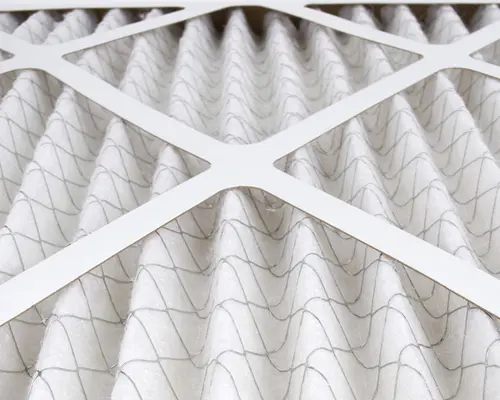
The HVAC filter in your home’s heating and cooling system plays an important role in maintaining temperature and indoor air quality. It also works to remove dust, pollen, pet hair, and other small particles from the air so you don’t breathe them in.
Essentially, your HVAC air filter traps airborne contaminants to prevent them from being recirculated throughout your house. Over time, this filter gets dirty and needs to be changed.
Here, we’ll examine HVAC filters more closely to help you determine how often you should change your air filter, understand why you need to change it, and more. If you need help with your air filter or other HVAC needs, give ARS/Rescue Rooter a call at 866-399-2885 or schedule service online.
How Long Can I Truly Go Before Changing My HVAC Filter?
While more expensive pleated air filters can get away with being changed up to every six months, these general guidelines don’t account for different filter sizes or types, like thicker or smaller filters.
How often should you change your air filter? Most manufacturers recommend changing basic fiberglass filters every 30 days. Higher-quality pleated filters should generally be changed every 90 days, though they can potentially last up to six months.
Why change the air filter so frequently? An old filter will naturally collect more dust, dirt, and allergens than a new one, becoming clogged and losing efficiency.
Not only does an old filter not work as well, but it can also strain your HVAC system, leading to higher energy bills and potential damage over time. Regular replacements help avoid these issues and keep your home comfortable and safe.
8 Reasons You Should Change Your HVAC Air Filter More Often
Here are some significant reasons to change your air filter more often.
1. Allergies & Asthma
A dirty air filter can affect people with allergies or respiratory conditions like asthma and COPD, as their lungs are more sensitive to dust and debris. This can sometimes lead to severe health issues, including asthma attacks.
If you have any of the above conditions, it’s recommended that you change your air filters on average every 20 to 45 days. Any longer periods than that can be detrimental to your health.
2. Pets
Many homeowners don’t just live with people, but with pets, too. Whether you have just one pet or a full house, animals can shed hair and other particles that can quickly clog up filters. If you’re a pet owner, changing your HVAC equipment (we’re talking filter traps, air filters, furnace filters, etc.) every 60 days is best.
3. The Size of Your Home
How often you should change your air filter also depends on the size of your home. A furnace or air conditioning system in a bigger home needs to pump more air for the same temperature change compared to a smaller home. This means bigger homes need more frequent filter changes.
However, do not rely solely upon this logic. Even if you have a smaller home, you should still regularly check your filters to see if they need replacing.
Related: What Size HVAC System Is Right for My Home?
4. HVAC System Use
Here’s some more logic for you—the more you use your HVAC system, the faster the filter will clog up. This means you may need to change your filter more frequently during high-use periods.
As spring turns into summer, you may find yourself using your air conditioning almost every day. But as fall turns to winter, you’ll find your heating use (furnace filter) will increase, too. Take extra care to change your filter regularly at these times.
Related: How to Properly Turn on Your Air Conditioner the First Time After Winter
5. Outdoor and Indoor Air Quality
The service life and replacement cycle of your furnace filter and air conditioner are also affected by outdoor and indoor air quality. If the air quality is poor, you’ll need to replace your air filter much more frequently. When poor-quality air circulates through your air filters, it’s more likely to cause malfunctions.
6. Your Home’s Location
If your home is in an area with high pollution or frequent dust storms, you may need to change your air filter more often. An urban area with heavy traffic or construction can also contribute to faster accumulation of dust and pollutants in your filters.
If you’re unsure how your local environment impacts your HVAC system, you can contact ARS/Rescue Rooter at 866-399-2885 for a consultation. We’re happy to help you figure out how to keep your system running smoothly and provide any heating maintenance or cooling maintenance services you may need.
7. The Age of Your HVAC System
Older HVAC systems may not be as efficient as newer models, meaning they can collect dust and debris more quickly. If your HVAC system is over 10 years old, you might need to change your air filter more frequently to maintain optimal performance.
8. Filter Type
The type of air filter you use significantly impacts how often it should be changed. Basic fiberglass filters must be replaced every 30 days, while higher-quality pleated filters can be replaced every 90 days if none of the above reasons for more frequent changes apply. Always follow the manufacturer’s recommendations for your specific filter type.
How to Visually Inspect Your HVAC Air Filter
Whether you’re an HVAC expert or not, the only way to be 100% sure of when your filter needs to be changed is to check it monthly. Once you’ve checked your filter a few times, you’ll have a pretty good idea of how quickly it becomes dirty.
To inspect the air filter, hold it up to a light source. If the light does not pass through, it means the filter is clogged and needs to be changed. You’ll also find a dirty filter looks gray rather than white.
If your filter gets clogged frequently, you may need to evaluate your living situation. For example, does your pet need to be groomed more regularly? Or is your indoor and outdoor air quality poor?
At ARS/Rescue Rooter, we offer home air filtration system installation to help improve your air quality and reduce strain on your HVAC system. Call us at 866-399-2885 to learn more.
Can I Run My HVAC System Without Using a Filter?
In short, yes. Your heating and cooling system can run without a filter. However, that doesn’t mean that you should let it. While running it this way for a short while may be OK, continuing to do so for a few hours or more is damaging—never mind a whole season or an entire year.
Besides, without an air filter, nothing can stop your HVAC system from blowing dust, dirt, and allergens into your home. Using a filter and changing it regularly is your safest bet for good air quality and a well-functioning HVAC system.
What Happens if I Don’t Change My HVAC Filter Regularly?
If you don’t regularly change your air filter, it will start to fail, and airborne dust and other contaminants will get into the system.
Dust blocks the moving parts of your HVAC system, including the fan motors and valves. This causes airflow to become restricted, which strains the system, running the risk of an air conditioning breakdown. Your HVAC system will have to work twice as hard to overcome these barriers, which makes the unit less energy efficient and increases your energy bills.
Trust ARS/Rescue Rooter for HVAC Maintenance and Repairs
Whether it’s furnace filters, air filters, or any other part of your unit, make sure you look after your HVAC system to extend its service life. If you’re not sure how—or how often—to change your air filter and would prefer an expert to come and assess or replace it, reach out to ARS/Rescue Rooter.
We are here to help with all of your heating, cooling, and filter needs. We can change your furnace filter, look at your air conditioner, install an air handler, inspect your indoor air quality, and perform any necessary HVAC repair or system maintenance. In addition to having a healthy, safe, and clean system, you’ll also keep your energy bills low.
Find your nearest ARS/Rescue Rooter location and get in touch with us at 866-399-2885 or schedule service online today!
Frequently Asked Questions
Can I Clean My Air Filter Instead of Replacing It?
Most disposable air filters are not designed to be cleaned and should be replaced. Some reusable filters can be washed and reused, but you should always follow the manufacturer’s instructions to ensure proper maintenance.
What Is the Best Filter to Buy?
The best filter depends on your needs. High-quality pleated filters are excellent for capturing small particles and allergens. Additionally, some of these filters are fantastic if you have a lot of pets. Look for filters with a high MERV rating for better filtration efficiency, but ensure they are compatible with your HVAC system.
How Do You Change Your Air Filter?
To change your air filter, follow these steps:
-
Turn off your HVAC system.
-
Open the panel over the filter.
-
Remove the old filter.
-
Insert the new filter following the arrows indicating airflow direction.
-
Ensure the filter fits snugly and securely before closing the panel and turning the HVAC system back on.






